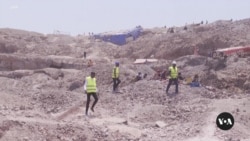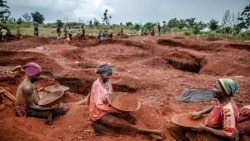ຜູ້ຕາງຫນ້າລັດຖະບານ ສະຫະລັດ ສໍາລັບການຮ່ວມມືດ້ານຄວາມປອດ ໄພກ່ຽວກັບແຮ່ທາດຕ່າງໆ, ເຊິ່ງເປັນພັນທະມິດຂອງບັນດາປະເທດຕາເວັນຕົກ ສ່ວນໃຫຍ່ທີ່ມີຈຸດປະສົງເພື່ອເລັ່ງໃສ່ການພັດທະນາລະບົບຕ່ອງໂສ້ການສະໜອງແຮ່ທາດພະລັງງານ, ກ່າວໃນເດືອນແລ້ວນີ້ວ່າ ບໍລິສັດຈີນ ໄດ້ນໍາໃຊ້ກົນລະຍຸດ “ທີ່ກິນປຽບ” ເພື່ອກົດລາຄາແຮ່ທາດສີເງິນ ຫຼື cobalt ຢູ່ປະເທດສາທາລະນະ ລັດປະຊາທິປະໄຕຄອງໂກ. ເຮັນຣີ ວີລກິນ (Henry Wilkins) ຈະພາໄປເບິ່ງວ່າມັນຫມາຍຄວາມວ່າແນວໃດສໍາລັບອາຟຣິກາ.
ໃນເດືອນແລ້ວນີ້, ທ່ານຈອສ ດັບເບິນຢູ ເຟີນານເດສ (Jose W. Fernandez) ຜູ້ຕາງຫນ້າຂອງ ລັດຖະບານ ສະຫະລັດ ທີ່ຮັບຜິດຊອບສໍາລັບ ການຮ່ວມມືດ້ານຄວາມປອດໄພກ່ຽວກັບແຮ່ທາດ ຫຼື MSP, ເຊິ່ງເປັນພັນທະມິດ ຂອງບັນດາປະເທດຕາເວັນຕົກສ່ວນໃຫຍ່ ທີ່ສ້າງຕັ້ງຂຶ້ນໃນປີ 2022 ກ່າວວ່າ ບໍລິສັດຂຸດຄົ້ນບໍ່ແຮ່ຂອງຈີນ ຫຼື CMOC ໄດ້ນໍາໃຊ້ “ການຄວບຄຸມລາຄາ” ເພື່ອຮັກລາຄາຂອງທາດ cobalt ທີ່ໄດ້ຮັບການກັ່ນແລ້ວ ຈາກສາທາລະນະລັດ ປະຊາທິປະໄຕຄອງໂກ ໃຫ້ຢູ່ໃນລາຄາຕໍ່າ.
ບາງຫຼາຍແຫ່ງບາງຄັ້ງ, ກໍນໍາໃຊ້ກົນລະຍຸດທີ່ຜິດກົດໝາຍໃນບາງປະເທດ, ເພື່ອຂັບໄລ່ການແຂ່ງຂັນອອກໄປ ແລະສ້າງການຜູກຂາດ.
ໃນການຕອບສະໜອງດ້ວຍການຂຽນຫາ VOA, CMOC ກ່າວວ່າ “ພວກເຮົາ ຂໍປະຕິເສດຢ່າງໜັກແໜ້ນຕໍ່ຂໍ້ກ່າວຫາຕ່າງໆເຫຼົ່ານັ້ນ. ໃນວົງວຽນຂອງລາຄາທີ່ ຜັນຜວນລະຫວ່າງ ຂອບເຂດຂອງຄວາມປົກກະຕິ ພ້ອມທັງການສະທ້ອນທີ່ ແທ້ຈິງຂອງການສະໜອງຕະຫຼາດ ແລະຄວາມຕ້ອງການ.”
MSP ກ່າວວ່າ ຈຸດປະສົງຂອງຕົນແມ່ນເພື່ອລົບລ້າງລາຄາທີ່ເອົາປຽບ ແລະ ປະຕິຮູບອຸດສາຫະກໍາການຂຸດຄົ້ນບໍ່ແຮ່ຂອງໂລກ, ບ່ອນທີ່ການຂູດຮີດແຮງງານ ແລະສະຖາບັນໃນບັນດາປະເທດທີ່ກໍາລັງພັດທະນາ ແມ່ນເລື່ອງທໍາມະດາ.
ທ່ານ ເຟີນານເດສ, ຜູ້ທີ່ເປັນທັງລັດຖະມົນຕີວ່າການກະຊວງສໍາລັບການຂະ ຫຍາຍຕົວທາງດ້ານເສດຖະກິດ, ພະລັງງານ ແລະສິ່ງແວດລ້ອມຂອງ ສະຫະລັດ ກ່າວວ່າ ແຮ່ທາດຕ່າງໆໃນອາຟຣິກາ ເຊັ່ນ: cobalt ແມ່ນຈໍາເປັນ ສໍາລັບການຫັນປ່ຽນຂອງໂລກໄປສູ່ພະລັງງານສີຂຽວ ເພື່ອປະເຊີນຫນ້າກັບ ການປ່ຽນແປງຂອງດິນຟ້າອາກາດ.
ທ່ານຈອສ ດັບເບິນຢູ ເຟີນານເດສ, ຜູ້ຕາງໜ້າການຮ່ວມມືດ້ານຄວາມໝັ້ນຄົງ ກ່ຽວກັບແຮ່ທາດຂອງສະຫະລັດ ກ່າວຜ່ານຊູມວ່າ:
“ພວກເຮົາຕ້ອງການອາຟຣິກາ, ພວກເຮົາຕ້ອງການຊັບພະຍາກອນໃນ ອາຟຣິກາ ເພື່ອດໍາເນີນງານ, ນັ້ນແມ່ນໂອກາດສໍາລັບອາຟຣິກາ, ແລະອາຟຣິກາ ສາມາດຮຽກຮ້ອງໃນສິ່ງທີ່ພວກເຂົາເຈົ້າຕ້ອງການສະເຫມີ, ເຊິ່ງແມ່ນການຊ່ວຍເຫຼືອດ້ານວິຊາການ, ການຖ່າຍທອດທາງດ້ານຄວາມຮູ້, ການເຮັດວຽກຮ່ວມກັບຊຸມຊົນຕ່າງໆ, ແລະການສະໜອງຜົນປະໂຫຍດ ຕໍ່ຊຸມຊົນ.”
ບັນດານັກວິເຄາະກ່າວວ່າ ສະຫະລັດ, ສະຫະພາບຢູໂຣບ ແລະບັນດາປະເທດ MSP ອື່ນໆ ຍັງມີຈຸດປະສົງທີ່ຈະຊີ້ນຳການຄວບຄຸມຍຸດທະສາດດ້ານຊັບພະຍາ ກອນຕ່າງໆ ໃຫ້ຢູ່ຫ່າງຈາກສາທາລະນະລັດປະຊາຊົນຈີນ ຫຼື PRC, ເນື່ອງຈາກການແຂ່ງຂັນກັບປະເທດຕາເວັນຕົກນັ້ນ ນັບມື້ນັບເພີ້ມທະວີຂຶ້ນ.
ທ່ານ ເຟີນານເດສ ກ່າວວ່າ ມັນບໍ່ແມ່ນກໍລະນີນີ້, ໂດຍທ່ານກ່າວຜ່ານຊູມວ່າ:
“ຈຸດປະສົງຢູ່ທີ່ນີ້ ແມ່ນເພື່ອສ້າງຄວາມຫຼາກຫຼາຍຂອງລະບົບຕ່ອງໂສ້ການສະ ໜອງຂອງພວກເຮົາ. ມັນແມ່ນຄວາມຈິງທີ່ວ່າ ໂດຍສ່ວນໃຫຍ່ແລ້ວ PRC ຄວບຄຸມແຮ່ທາດເຫຼົ່ານີ້ເປັນຈໍານວນຫຼາຍ. ຄວາມຫຼໍ່ແຫຼມເຫຼົ່ານັ້ນບໍ່ພຽງແຕ່ສົ່ງຜົນຕໍ່ຕາເວັນຕົກເທົ່ານັ້ນ ແຕ່ມັນສົ່ງຜົນຕໍ່ ພວກເຮົາທັງຫມົດ. ພວກເຮົາມີເປົ້າໝາຍທີ່ຈະດໍາເນີນການທັງໝົດກ່ຽວກັບສິ່ງນີ້ ໃນຂະນະທີ່ພວກເຮົາຍຶດໝັ້ນຄຸນຄ່າທາງດ້ານສິ່ງແວດລ້ອມ, ສັງຄົມ ແລະມູນ ຄ່າຂອງການຄຸ້ມຄອງ, ແລະນັ້ນ ຂ້າພະເຈົ້າໝາຍເຖິງການເຮັດວຽກຮ່ວມກັບຊຸມຊົນ ເພື່ອຮັບປະກັນໃຫ້ປະຊາຄົມໄດ້ຮັບຜົນປະໂຫຍດຈາກຊັບພະຍາກອນທຳມະຊາດຂອງພວກເຂົາເຈົ້າ.”
ບັນດາຜູ້ຊ່ຽວຊານດ້ານການຂຸດຄົ້ນແຮ່ທາດກ່າວຕໍ່ VOA ວ່າ ບໍລິສັດຕ່າງໆ ຂອງ ຈີນ ກໍາລັງປະຕິບັດບາງຢ່າງທີ່ຮ້າຍແຮງໃນອຸດສາຫະກໍາການຂຸດຄົ້ນ ບໍ່ແຮ່, ແລະນັ້ນ MSP ມີຄວາມສໍາຄັນໃນການຊົດເຊີຍຕໍ່ສິ່ງຕ່າງໆເຫຼົ່ານັ້ນ.
ທ່ານອັນເດຣ ບາຢາ (André Baya), CEO ຂອງ Kore Potash, ເຊິ່ງເປັນບໍລິສັດຂຸດຄົ້ນບໍ່ແຮ່ທີ່ດໍາເນີນການຢູ່ໃນສາທາລະນະລັດຄອງໂກ ກ່າວວ່າ:
“ມັນເປັນການກະທໍາທີ່ສໍາຄັນເຊິ່ງຈະຕ້ານກັບຜູ້ທີ່ມີຂໍ້ຂັດແຍ້ງ ທີ່ບໍ່ມີຈັນຍາບັນ ອັນດຽວກັນ. ສິ່ງທີ່ເກີດຂຶ້ນ ແມ່ນການທີ່ມີນັກລົງທຶນເອກະຊົນຈີນ ຈໍານວນຫຼາຍ ຢູ່ໃນອາຟຣິກາ ໂດຍບໍ່ໄດ້ຮັບການຄວບຄຸມຈາກລັດຖະບານ ແລະປະເທດຂອງ ພວກເຂົາ, ແລະພຶດຕິກໍາຂອງພວກເຂົາ ກໍສາມາດເປັນສິ່ງທີ່ຫນ້າຕົກໃຈທີ່ສຸດ.”
ນັກວິເຄາະຄົນນຶ່ງກ່າວວ່າ ວຽກງານຂອງ MSP ແມ່ນສິ່ງຫຍຸ້ງຍາກ ເພາະວ່າ MSP ແລະບັນດາປະເທດຕາເວັນຕົກ ມີທ່າອ່ຽງທີ່ບໍ່ຄືກັນ, ການຄວບຄຸມ ຫຼື ການຫາຜົນປະໂຫຍດນັ້ນ ຈີນ ຢູ່ເໜືອກວ່າບໍລິສັດເອກະຊົນຕ່າງໆຂອງຕົນ.
ທ່ານຄຣິສຕຽນ-ເຈີຣາດ ນີມາ (Christian-Géraud Neema), ໂຄງການຈີນ-ໂລກໃຕ້ ກ່າວວ່າ:
“ດັ່ງນັ້ນ, ນີ້ແມ່ນເຫດຜົນທີ່ວ່າ ບໍ່ວ່າຊິເປັນ MSP, IRA ຫຼື ກົດຫມາຍວ່າດ້ວຍ ວັດຖຸດິບທີ່ສໍາຄັນໃນ ຢູໂຣບ ຫຼື ການເລີ້ມຕົ້ນໃດໆໃນ ການາດາ ຫຼື ອອສເຕຣເລຍ ກໍຕາມ, ທັງຫມົດເຫຼົ່ານັ້ນແມ່ນຂຶ້ນກັບສິ່ງດຽວ. ພວກມັນຂຶ້ນກັບ ຄວາມຈິງທີ່ວ່າ ບໍລິສັດເອກະຊົນຕ່າງໆ ຈະເຕັມໃຈທີ່ຈະປະຕິບັດຕາມຍຸດທະ ສາດ ຫຼືບໍ່.”
ທ້າຍສຸດແລ້ວ, ທ່ານ ເຟີນານເດສ ກ່າວວ່າ ບັນດາປະເທດຕ່າງໆໃນອາຟຣິກາ ຈະຕ້ອງຕັດສິນໃຈດ້ວຍຕົນເອງວ່າ ຈະເປັນພາຄີກັບປະເທດໃດ.
ອ່ານບົດລາຍງານດ້ານລຸ່ມນີ້ເປັນພາສາອັງກິດ
The U.S. government's representative to the Minerals Security Partnership, an alliance of mostly Western countries that aims to speed the development of energy mineral supply chains, said last month that a Chinese company was using "predatory" tactics to hold down the price of cobalt mined in the Democratic Republic of Congo. Henry Wilkins looks at what this means for Africa.
Last month, Jose W. Fernandez, the U.S. government's representative to the Minerals Security Partnership, ((end courtesy)) or MSP, an alliance of mostly Western countries set up in 2022, said a Chinese mining company, CMOC, was using “predatory pricing” to keep the cost of cobalt extracted from the Democratic Republic of Congo down.
Businesses sometimes use the tactic, illegal in some countries, to muscle out competition and establish a monopoly.
In a written response to VOA, CMOC said: "We firmly deny the accusations. ... This round of price fluctuation is within the normal range and is a true reflection of market supply and demand."
The MSP says its aim is to eliminate predatory pricing and to reform the world's mining industry, where exploitation of workers and institutions in developing nations is common.
Fernandez, who is also the U.S. undersecretary of state for economic growth, energy and the environment — says African minerals like cobalt are essential for the world’s transition to green energy in the face of climate change.
((Jose W. Fernandez, Minerals Security Partnership US Representative (in English, 20 secs))) ((Zoom))
"We need Africa. We need African resources in order to do that. That’s an opportunity for Africa, and Africa can demand what it’s always wanted, which is technical assistance, knowledge transfer, working with communities, benefiting communities."
Analysts say that the U.S., European Union and other MSP countries are also aiming to steer control of strategic resources away from the People’s Republic of China, as its rivalry with the West intensifies.
Fernandez says this isn’t the case.
((Jose W. Fernandez, Minerals Security Partnership US Representative (in English, 27 secs))) ((Zoom))
"The objective here is to diversify our supply chains. It is true that for the most part, the PRC controls many of these minerals. // That’s a vulnerability not only for the West, but for all of us. We aim to do all of this while upholding high environmental, social and governance values, and by that I mean working with communities to make sure the communities benefit from their natural resources."
Mining experts told VOA that Chinese companies are carrying out some of the worst practices in the mining industry, ((Mandatory CG: Zoom)) and that the MSP is important in offsetting that.
((For radio: André Baya is CEO of Kore Potash, a mining company operating in the Republic of the Congo.)) [[Kore pronounced "core"]]
((André Baya, Kore Potash CEO (in English, 35 secs)))
"It's an important reaction to counteract those that do not have the same scruples.// What happens is you’ve got a lot of private Chinese investors in Africa who are no longer even being reined in by their government and their country, and their behavior can be the most shocking."
One analyst says the MSP's task is difficult because it and Western countries do not have the same sway, control or leverage that ((Mandatory CG: Zoom)) China has over its private companies.
((For radio: Christian-Géraud Neema is with the China-Global South Project.))
((Christian-Géraud Neema, The China-Global South Project (in English, 27 secs)))
"So, that’s why whether being the MSP, the IRA or the Critical Raw Materials Act in Europe or any kind of initiative in Canada or Australia, they are all depending on one thing. They’re depending on the fact that private companies will be willing to follow through with the strategy."
Ultimately, Fernandez says, African countries will have to decide for themselves whom to partner with.







ຟໍຣັມສະແດງຄວາມຄິດເຫັນ